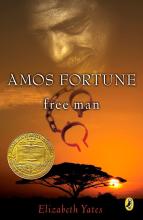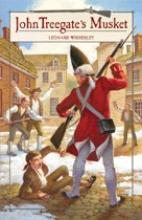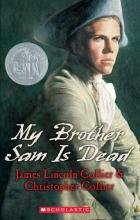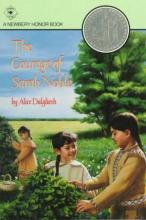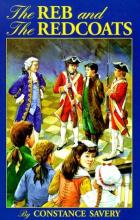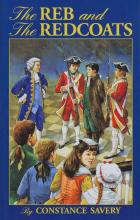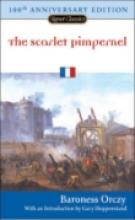18th century Historical Fiction
Amos Fortune: Free Man
Amos Fortune is the true story of a man who was born in Africa – the son of a great chief – and was kidnapped (along with many people from his tribe) and taken to America, where he was sold into slavery. He was purchased by a Quaker family in New England who treat him more like a son than a slave and teach him to read and help him to embrace the Christian faith. Through an agreement with his first owner, Amos eventually earns his own freedom. He proceeds to work very diligently and live very simply in order to earn enough money to buy the freedom of several other slaves over the course of his lifetime. The author simply portrays the virtues of diligence, patience and perseverance evident in this honest man. The story takes place at the time of the American Revolution.
Becky Landers: Frontier Warrior
John Treegate's Musket
My Brother Sam is Dead
My Brother Sam is Dead is the story of a boy whose brother rebels against his father to join the colonial army in the Revolutionary War. There are many good things to recommend about this story and some warnings to give also.
The boy, Tim Meeker, is witness to the chaotic events of the war. The book gives a good description of the confusion of the times with occupying armies and defiant citizens, senseless death and seemingly cruel punishments. Tim's brother, Sam, joins the patriot army against his father's wishes and even returns to steal his father's gun. Sam's father is a staunch loyalist and scandalized by his son's behavior. The father has also had a taste of war in the French and Indian war and does not want his son to have to experience the horror of it. The son thinks he knows better.
As the war progresses, and goods become scarce, armies on both sides resort to commandeering or stealing for food and supplies. Tim's father is arrested as he is bringing a load of supplies to the tavern he runs and Sam is arrested for stealing cows, which he did not steal. Tim's father dies on a British prison ship and Sam is executed by his own army for theft. The scene of the execution is somewhat unsettling as are other scenes like it in the book.
This is definitely an anti-war story. The authors end the book by asking if we might have been able to accomplish independence without a war. Throughout the story the atrocities of war are reflected upon by Tim and there are many quotes by Tim's father about the price of war, such as, "In war, the dead pay the debts of the living." This slant by the author would make a great subject for discussion.
Another very interesting aspect of story is that the rebellion of the son to his father directly parallels the rebellion of the colonies to the father country, England. The exchanges between father and son could be laid right across the colonies and England. Yet another interesting aspect is the irony of the deaths of father and son. Father, as a loyalist, dies in a prison ship as a prisoner of the country he professes and Sam, as a rebel, dies at the end of an firing squad of his fellow patriots. All of these make this book a great vehicle for discussion of author's bias and purpose, of literary devices such as irony and story structure, and finally of the ideas behind the war itself.
However, there is one great drawback to the story. There is an enormous amount of swearing in it, including taking the Lord's name. If it were just once or twice, you might be able to overlook it, but one teacher I know counted and found over fifty instances of swearing. If you want your children to have the experience of the book, you might consider reading it aloud and editing out the swearing as you read. However, there are many other books available which discuss the ideas of the Revolutionary War while avoiding this drawback.
Newbery Honor Book
Silver for General Washington
Silver for General Washington is an engrossing story about twelve-year-old Gil and his sister, Jen, who are living in Valley Forge with their cousins during the occupation of Philadelphia. Before leaving their well-to-do home in Philadelphia, Gil helped his father bury all the family silver in a chest beneath the house. As the winter progresses and conditions grow worse for the poor soldiers, Gil overhears people saying that what's really needed is money to get food and other supplies. Knowing that it's what his father would want (his father is away on war business) Gil decides to sneak back into Philadelphia to recover the silver himself and offer it to General Washington. A nice story that brings to life the struggles and courage present in a critical and difficult time in our country's history that is all too often taken for granted.
Suitable for a family read-aloud or independent reading grades three and up.
The Courage of Sarah Noble
The Courage of Sarah Noble is based on the true story of eight year old Sarah Noble, who accompanies her father into the Connecticut wilderness to cook meals for him as he builds the family's cabin. The story takes place in 1707 and focuses on her courage against the unknown fears of the wilderness.
Because the book focuses so much on her courage, this book could be used as a springboard for discussing the role of Guardian Angels in our lives. Of course, it should be mentioned to the child reading the story that Sarah was not Catholic and would not know that she could pray to her Guardian Angel whenever she was frightened. In the same light, it would also have been nice if Sarah would have placed more faith in God and said a prayer every time she was frightened instead of clutching her cloak or repeating the words "'keep up your courage.'" Sarah does, however, say her night prayers when she stays with an Indian family while her father returns home to bring the rest of the family to the cabin and she does read her Bible. (Both incidents are naturally interwoven in the story.)
In particular, I really liked the way Dalgliesh develops Sarah's relationship with her father. It is very heart warming to see this kind of relationship presented in literature. Not only is he a good role model as a father, but, as a character, he speaks with wisdom. He is very gentle, patient, and loving with her. One statement that he makes that is very heartening to hear is when he says, "'It was a blessing the Lord gave me daughters, as well as sons.'" How many daughters in real life yearn to hear their fathers say this? He also comments, when he is referring to the Indians, "'In our home all will be treated with kindness always Sarah.'" This is a nice counterpoint to the fear she had of the Indians as ruthless savages. The story also realistically makes clear that although some Indians are peaceful, some are to be feared.
My only concern with the story would be that I would be hesitant to read this story aloud with younger children (4 year olds) in the room who are already fearful by nature, because of the constant emphasis of her fear. For the age that it is intended, it should not be a problem.
Overall, this is an easy to read short chapter book for the 3rd-6th grade reader. It is a very realistic portrayal of life in the wilderness as a little girl struggles to overcome her fears, at the same time trying to do the right thing. Because of the way each chapter is presented, this book would be ideal for discussing each chapter's theme between the parent and child. I would recommend this book along with discussion. For example, "Do you think it was kind for the children to tease Sarah?" What could they have said instead.
The Reb and the Redcoats
One of the many books my wife discovered. After she read it aloud to the kids they wanted me to read it to them AGAIN at their nightly story time before bed. Though this novel is written for children I stayed up late to finish it myself after one such session! It takes place in England during the American Revolutionary War. The main character of the book is a captured American 'Rebel'. He is befriended by the children of the country house where he is held prisoner. But by his actions he proves so honorable that he is given freedom to roam the estate and is eventually even hired, during his captivity, to tutor the children in their studies. Everyone in the family begins to love him – but he is bound to escape and complete his mission. I will let YOU stay up late to find out what happens.
I found this book full of living examples of the many virtues that make up an honorable person (honesty, loyalty, integrity, desire to learn, courtesy, etc.) and yet also just plain enjoyable. The style includes glimpses into human nature that make you laugh when you unexpectedly recognize them.
The Reb and the Redcoats
The Reb and the Redcoats is an adventurous historical fiction story about a British family during the American Revolution who "play host" to an American prisoner of war. 15 year old Randal is a well-educated Virginian who was sent on a military mission as a French interpreter. When he and his comrades are captured, he gives his captors no end of trouble with his escape attempts and is finally confined to an old penance cell at the estate of Laurence Templeton (which had once been a monastery). Things get interesting when Captain Templeton's elder sister, Mrs. Darrington and her four children arrive for an indefinite stay at the estate. The children are fascinated by the American Rebel and can't understand why Uncle Laurence is so resentful of his presence.
This is one of the most delightful stories I've read in a long time. Although it is recommended for ages 10 and up, our entire family enjoyed this story immensely. Not only is it a very enjoyable and well-told tale (with accurate historical details), but there are some very nice lessons tied into the story about how we should treat other people and how easy it is to misjudge.

